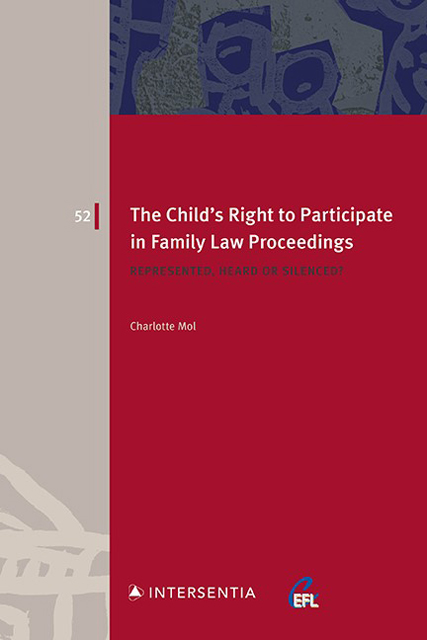Book contents
- Frontmatter
- Acknowledgements
- Contents
- List of Tables and Figures
- List of Abbreviations
- List of International and European Instruments and Sources
- List of Cases
- Chapter 1 Introduction
- Part I The Child’s Right to Participate in International and European Human Rights Instruments
- Part II The Child’s Right to Participate in The Case Law of the ECtHR
- Part III Comparative Remarks and Conclusions
- Appendix: Categorization of Cases Per Type of Proceeding
- Bibliography
- Index
- About the Author
- European Family Law Series
Chapter 3 - The Child’s Right to Participate in European Human Rights Instruments
Published online by Cambridge University Press: 20 April 2023
- Frontmatter
- Acknowledgements
- Contents
- List of Tables and Figures
- List of Abbreviations
- List of International and European Instruments and Sources
- List of Cases
- Chapter 1 Introduction
- Part I The Child’s Right to Participate in International and European Human Rights Instruments
- Part II The Child’s Right to Participate in The Case Law of the ECtHR
- Part III Comparative Remarks and Conclusions
- Appendix: Categorization of Cases Per Type of Proceeding
- Bibliography
- Index
- About the Author
- European Family Law Series
Summary
‘Convinced that the rights and best interests of children should be promoted and to that end children should have the opportunity to exercise their rights, in particular in family proceedings affecting them …’
– Preamble to the European Convention on the Exercise of Children’s RightsIntroduction
While the United Nations Convention on the Rights of the Child (UNCRC) is the beacon of children’s rights, in the past few decades the Council of Europe (CoE) and the European Union (EU) have also increasingly committed themselves to the topic. Within Europe, both have worked towards ‘building a pan-European space fit for children’ by further strengthening children’s rights. In doing so, children’s rights have seeped into the European human rights framework. Nowadays, a myriad of European human rights instruments address children’s participation. Most of these are new instruments, either drafted specifically to address children’s rights (for example, the European Convention on the Exercise of Children’s Rights, as the quote above shows) or more general human rights instruments which include children’s rights (for example, the Charter of Fundamental Rights of the European Union (CFREU)). Many of the 47 Council of Europe Member States are bound to one or more of these new instruments in addition to the UNCRC, as we have seen in Chapter 1, Figure 1.1.
In this chapter, four of the five European human rights instruments which address child participation in family law proceedings are studied: the European Convention on the Exercise of Children’s Rights (ECECR), the Guidelines on Child-Friendly Justice (GCFJ), the Recommendation on the participation of children and the CFREU. The aim is to determine the standards set by these instruments regarding children’s right to participation in family law proceedings in Europe. These four instruments add to the core instruments: the UNCRC, as discussed in the previous chapter, and the ECHR with the case law of the ECtHR, as will be discussed in depth in Part II.
- Type
- Chapter
- Information
- The Child's Right to Participate in Family Law ProceedingsRepresented, Heard or Silenced?, pp. 87 - 118Publisher: IntersentiaPrint publication year: 2022



